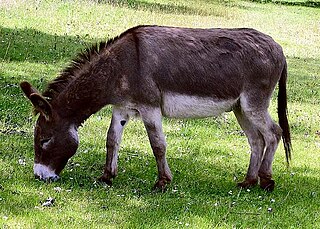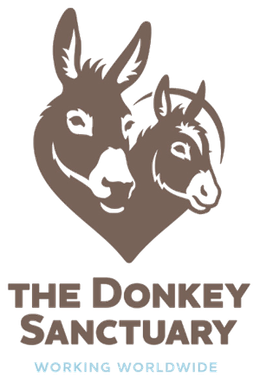
The donkey is a domesticated equine. It derives from the African wild ass, Equus africanus, and may be classified either as a subspecies thereof, Equus africanus asinus, or as a separate species, Equus asinus. It was domesticated in Africa some 5000–7000 years ago, and has been used mainly as a working animal since that time.

Princes Risborough is a market town and civil parish in Buckinghamshire, England, about 9 miles (14 km) south of Aylesbury and 8 miles (13 km) north west of High Wycombe. It lies at the foot of the Chiltern Hills, at the north end of a gap or pass through the Chilterns, the south end of which is at West Wycombe. The A4010 road follows this route from West Wycombe through the town and then on to Aylesbury.

Loosley Row is a hamlet in the civil parish of Lacey Green, Buckinghamshire, England. It is located in the Chiltern Hills to the east of the main town of Princes Risborough. In the 2011 Census, the population was recorded in the Lacey Green Parish, which included Speen, parts of Walter's Ash, and Lacey Green, with a combined population of 2,559.

The Royal Veterinary College is a veterinary school located in London and a member institution of the federal University of London. The RVC was founded in 1791 and joined the University of London in 1949. It is the oldest and largest Veterinary school in the United Kingdom, and one of only 11 in the country where students can study to become a vet.

A zebroid is the offspring of any cross between a zebra and any other equine to create a hybrid. In most cases, the sire is a zebra stallion. The offspring of a donkey sire and zebra dam, called a donkra, and the offspring of a horse sire and a zebra dam, called a hebra, do exist, but are rare and are usually sterile. Zebroids have been bred since the 19th century. Charles Darwin noted several zebra hybrids in his works.
The Scottish Society for the Prevention of Cruelty to Animals is a charity to promote animal welfare in Scotland.

An animal sanctuary is a facility where animals are brought to live and to be protected for the rest of their lives. Pattrice Jones, co-founder of VINE Sanctuary defines an animal sanctuary as "a safe-enough place or relationship within the continuing hazards that menace everybody". In addition, sanctuaries are an experimental staging ground for transformative human–animal relations. There are five types of animal sanctuaries reflective of the species-belonging of the residents: 1) companion animal sanctuaries; 2) wildlife sanctuaries; 3) exotic animal sanctuaries; 4) farmed animal sanctuaries; and 5) cetacean sanctuaries.

The British Horse Society (BHS) is a membership-based equine charity, with a stated vision of "a Society which provides a strong voice for horses and people and which spreads awareness through support, training and education". It currently has more than 110,000 members, with a further 34,000 members affiliated through a British Riding Club, making it the largest equine membership organisation in the United Kingdom. It is one of the 19 organisations which form part of the British Equestrian Federation.

Hillside Animal Sanctuary, based in Frettenham, Norwich, and with a site at West Runton, North Norfolk, is the United Kingdom's largest home for different kinds of farm animals and horses. The vegan-run sanctuary is funded entirely on public donations. The sanctuary was established by Wendy Valentine and its patron is actor Martin Shaw.

The Donkey Sanctuary is a British charitable organisation devoted to the welfare of donkeys. The charity, which is based near Sidmouth in Devon, England, was founded in 1969. It is one of the largest equine charities in the world with an annual income and expenditure of £37 million.

The Building Research Establishment (BRE) is a centre of building science in the United Kingdom, owned by charitable organisation the BRE Trust. It is a former UK government national laboratory that was privatised in 1997. BRE provides research, advice, training, testing, certification and standards for both public and private sector organisations in the UK and abroad. It has its headquarters in Garston, Hertfordshire, England, with regional sites in Glasgow, Swansea, the US, India, the Middle East and China.
Living Legends is a nonprofit equine charity located at 207 Oaklands Road in Woodlands Homestead at Woodlands Historic Park in Greenvale near Melbourne, Australia. Opened to the public on 31 October 2006, the organization's primary activity is bringing champion and popular gelding racehorses back to the people; but it also supports the care of older horses, equine research, education and training to benefit horses of any age or breed.
The Equus Survival Trust is a United States nonprofit organisation dedicated to helping conservation efforts for over 25 horse breeds considered "endangered" by the organization due to their rarity and danger of dying out. It is dedicated to protecting the genetic diversity and traditional traits of historical horse, pony and donkey breeds that are currently nearly extinct. They are doing this through conservation efforts, public education and support of associations for rare breeds. The organization places an emphasis on North American breeds and breeders. The Trust is the only conservation organization in the world that specializes in equines.

Redwings Horse Sanctuary is a registered charity that provides a home for rescued horses, based in Norfolk, England.
Brooke is a United Kingdom-based international equine charity, which focuses on the welfare and care of donkeys, horses and mules. With more than 900 people working helping to deliver services, Brooke is the largest equine charity in the world.
Spindles Farm was a farm in Hyde Heath, near Amersham, Buckinghamshire, England, run by horse dealer James Gray. It was the location of a significant animal cruelty case in 2008 where dozens of horses were neglected, some being left to starve to death. The incident was described as "the worst case ever experienced by the RSPCA" by the judge at the resulting court trial.

Belwade Farm is a horse stables near Aboyne, Scotland owned by World Horse Welfare.
The Irish Horse Welfare Trust is a registered animal welfare charity in Ireland. According to its website, it was formally set up in 2001 to help the plight of neglected horses in Ireland, and has been Ireland’s largest dedicated equine charity. It was established to provide a dedicated centre that is equipped for dealing with the rehabilitation and re-homing equines.












